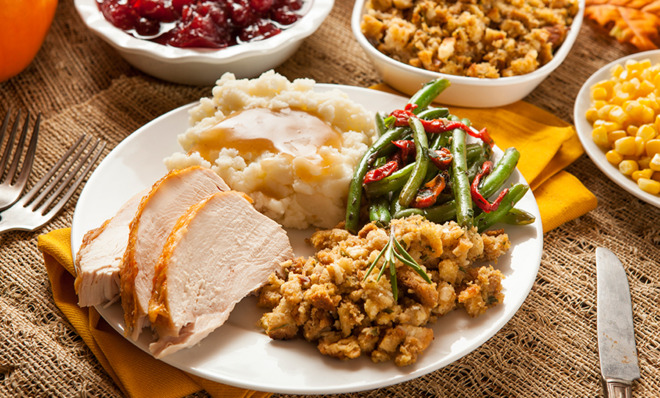8 tricks to surviving the holidays without gaining weight or being grouchy
Indulge yourself. But only a little.


A free daily email with the biggest news stories of the day – and the best features from TheWeek.com
You are now subscribed
Your newsletter sign-up was successful
At its most basic level, food is fuel. That's why so many competitive athletes eat a carefully calculated mix of fats, proteins, and carbohydrates designed to maximize performance.
At the other end of the epicurean spectrum lies the notion of food as exquisite sensual experience and important social construct. One has only to watch Babette's Feast, the 1987 film based on a story by Isak Dinesen, to understand just how life-changing a wonderful meal, shared with others, can be — even if said meal is loaded with unhealthy fats, sugars, and other products of dubious environmental origin.
As a big fan of middle ground — and as a woman of a certain age attempting to stay healthy and physically competitive without turning into a Food Bore — I've discovered you don't have to subscribe to either extreme in order to stay on track and enjoy all of the pleasures that great food and convivial company can bring. The key is balance — not that this is always easy.
The Week
Escape your echo chamber. Get the facts behind the news, plus analysis from multiple perspectives.

Sign up for The Week's Free Newsletters
From our morning news briefing to a weekly Good News Newsletter, get the best of The Week delivered directly to your inbox.
From our morning news briefing to a weekly Good News Newsletter, get the best of The Week delivered directly to your inbox.
The holidays can be a particularly challenging time for people seeking to enjoy the pleasures of the season without the need to detox and/or let out their trousers come January 1. Allow me to help, with these tried-and-true methods to navigate the seasonal maze of huge meals, endless cocktail parties, and those particularly pernicious dishes of candy that seem to spring up everywhere at this time of year.
1. Start a journal
Buy a notebook and start writing down everything you eat. Everything. No cheating. If it crosses your lips and it is neither your toothbrush nor a lover's tongue, write it down.
Also make notes about your physical activity, although it's not a good idea to try and "make up for" overeating with extra exercise. Instead, observe how you feel as you go out for your usual daily activity. Focused and motivated? Disinclined and easily tired?
A free daily email with the biggest news stories of the day – and the best features from TheWeek.com
It's all about awareness. It is easy to mindlessly nibble your way through all of the treats so readily available at this time of year. The discipline of writing everything down forces you to be conscious of what and how much you're eating.
Keeping track of how you feel during your daily routine also lets you draw correlations between certain things you eat and the way your body responds. If that rugelach you just couldn't resist Friday night ruins your Saturday morning walk by roiling around in your belly like an errant boulder, you might be more inclined to give the pastry a pass next week. Journaling can motivate you to stay clear of foods and drinks that don't make you feel good as the season progresses, and encourage you to indulge in good stuff that makes you feel good, too.
2. Be a picky eater
After a period of mindful eating, supported by your journal, you will have a pretty good sense of what foods do and don't work for you. Make note of the ones that consistently set you back. If dairy turns out to be the reason your yoga asanas seem to be more like "gas"anas, then be smart about when and how much dairy you eat. You don't have to completely bypass the table of artisanal cheeses that seems to be the star of every cocktail party these days, but do limit yourself to one small serving. And if the surf is up, and you want to have a good session the next morning? It might be worth it to take a reluctant pass on your favorite offering from Cowgirl Creamery in order not to be a complete washout the next day.
We all have foods that disagree with us. Pinpointing which those might be doesn't mean pretending you have any sort of trendy intolerance, it just means you can be conscious of your indulgences and how they affect you, so your can make your eating decisions accordingly.
3. Veggies first...
Peckish at your company's holiday mixer? Eat three carrots, two baby cucumbers, and a radish before you even think about hitting the sushi bar. Face-to-face with the omelet chef at your sister's Annual Festive Brunch? Ask her to sauté up some spinach, onions, and mushrooms, and eat these before you head back for the Full Monty. At Thanksgiving, fill up two-thirds of your plate with vegetables: peas and onions, plain sweet potatoes, green beans …. Mmmm. Then move on to the rest of the buffet.
Eating vegetables first helps fill you with healthy fiber even as it encourages your taste for the foods that should, according to most nutritionists, form the mainstay of what we eat.
4. ...And everything else in moderation
Proteins, especially healthy lean ones like turkey or eggs, are a good next step. As you think about rounding out the remaining one-third of your meal, veer toward these: sashimi, shrimp, lean prime rib. Being smart does not mean denying oneself. Whole wheat bread or brown rice can be excellent supporting players here, too — just don't load up on them.
Admit that your grandmother was right: Your eyes are bigger than your stomach. When you first sit down to a meal, you might be inclined to load up a massive plate, justifying the giant slabs of meat and big pile of wheat pasta by telling yourself these things aren't necessarily bad for you. But they can be — if you end up eating more than you truly need simply because you were hungry when you started. Unless you are in the kind of physical training that calls for exceptional number of calories each day, help yourself to servings of meat or healthy carbohydrates no larger than the size of your palm.
5. Don't be a food martyr
It's the holidays, for heaven's sake! If you gaze sadly and shuffle right by the stuffing and the latkes, the sweetened cranberry sauce, white bread, gravy, or any other holiday food that might mean, to you, the essence of holiday eating, then you're making a big mistake.
You can have those things. Of course you can. We all have little cravings, and a healthy person can take a yummy tablespoons of two (no more than three) indulgences on occasion. Same goes for desserts. A bite of pumpkin or pecan pie now and then will tingle your tastebuds. Eating a whole piece every day will probably make you feel sick.
So go ahead and indulge a little. You'll be happier for it, and, as an added bonus, you won't be perceived as a spoilsport Culinary Grinch by everyone else.
6. Don't say "no"
This brings us to an important topic: well-meaning wellness saboteurs. These people may love you — they may be dear friends, or even your parents or grandparents! — but if they note you moderating your diet during the holidays, they might misunderstand and worry that you are denying yourself the Joys of the Season. And since they love you, they will encourage you to circle back and load up on the stuff that you may prefer not to overindulge in.
So don't say, "No." "No" is negative. At worst, it can be read as rejection; at best it can be a challenge to hosts or family members who want to make sure you are enjoying yourself. Rather than declining an offer of a certain food (or more food), smile broadly and say, "I'm great, thanks! I'm having such an amazing time. The Turducken/beignets/yams-with-baby-marshmallows were out of this world."
This phrase sends the message that you are happy, that you are not denying yourself, and that they are not failing you as hosts. You may need to trot it our more than once or twice in order for them to get the message, but they eventually will.
7. Don't preach, either
Your boss' Christmas Eve soiree is not the time to pull up a nutritional soapbox and drop down a treatise on healthy eating habits. All too often, people who have discovered just how great it feels to moderate their diets and gear toward wellness feel a sort of evangelical passion to spread the word. Don't do this, even if you need to pinch yourself in order to stop talking about how much reading Wheat Belly changed your life.
No one wants to hear about your dietary choices. Far less do they want to be made to feel ashamed of their own. There are so many great topics of conversation these days: Successful space exploration, baby giraffes, fantasy football … Stick to these.
8. Finally, a note on alcohol: 2 to 1
If you drink alcohol, the holidays are a natural time to indulge your taste for great wine or a many-times-distilled favorite liquor. Limit yourself to two drinks an evening, and drink two glasses of water for every alcoholic drink you savor.
Alcoholic drinks are high in sugars and oxidants that take a toll on your body. Don't drink too much. You won't feel well. If you're smart and stick to the good stuff, two will be enough.
Alcohol is also dehydrating. Replacing the water you lose with two glasses of pure H20 not only relieves pressure on your internal organs, it'll help you discreetly pace out those two drinks even while others may be pounding down cocktail after cocktail.
Whatever winter holidays you celebrate, they no doubt have a particularly special and important meaning for you. Every culture in this world celebrates its important occasions with food and drink, and so should you. By taking a few simple steps to manage your diet during this time, you will be better able to enjoy this long and festive season as a happy, healthy celebrant.
Leslie Turnbull is a Harvard-educated anthropologist with over 20 years' experience as a development officer and consultant. She cares for three children, two dogs, and one husband. When not sticking her nose into other peoples' business, she enjoys surfing, cooking, and writing (often bad) poetry.
-
 The ‘ravenous’ demand for Cornish minerals
The ‘ravenous’ demand for Cornish mineralsUnder the Radar Growing need for critical minerals to power tech has intensified ‘appetite’ for lithium, which could be a ‘huge boon’ for local economy
-
 Why are election experts taking Trump’s midterm threats seriously?
Why are election experts taking Trump’s midterm threats seriously?IN THE SPOTLIGHT As the president muses about polling place deployments and a centralized electoral system aimed at one-party control, lawmakers are taking this administration at its word
-
 ‘Restaurateurs have become millionaires’
‘Restaurateurs have become millionaires’Instant Opinion Opinion, comment and editorials of the day
